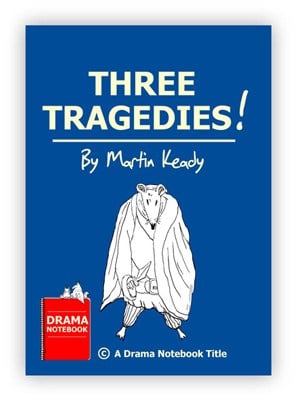Three Tragedies is a collection of three short plays about some of Shakespeare’s most famous minor characters: EMILIA is the story of Iago’s abused wife; THE MURDER OF THE SERVANTS is the story of Duncan’s servants in Macbeth, who are framed by Macbeth for Duncan’s murder; and THE FOOL’S TALE is the story of Lear’s Fool, after he leaves the blasted heath. These clever plays can be performed together or separately and are the perfect addition to any Shakespeare curriculum or production!
Martin Keady is an award-winning scriptwriter whose work has been produced for film, television, stage and radio. His major credits include: The Final, a short film about the famous ending of the 1979 FA Cup Final, which was shown on Channel Four; Moon the Loon, a play about the legendary Who drummer, Keith Moon, which was premiered at The Edinburgh Festival; and a collection of love poetry, Shards, extracts from which have been broadcast on Radio Four. He has also written extensively for numerous print and online publications, including Channel Four News.com, Scriptlab and The Shakespeare Standard. He has a Masters Degree in Shakespeare Studies from The Shakespeare Institute in Stratford on Avon, and he lives in London with his wife and three children.
Excerpt from the play:
CAST OF CHARACTERS
A WOMAN (middle-aged)
A MAN (also middle-aged)
A DOCTOR (aged about thirty) A GUARD
SET
A hospital room. The stage is bare, apart from a bed in the middle of it, with a chair and a cabinet beside it. In a bed, in the middle of the room, a MIDDLE-AGED WOMAN is lying completely still: it is unclear whether she is dead or just sleeping. Sitting next to her on a chair beside the bed is a MIDDLE-AGED, OFFICIOUS-LOOKING MAN. A young DOCTOR (aged about 30) enters, carrying a small, leather doctor’s bag, which he puts down on the bedside cabinet.
He looks at the MAN sitting beside the bed.
DOCTOR:
Who are you?
MAN:
I’m an Investigator, from the Senate. They want to know what happened.
DOCTOR:
But I thought messengers had been dispatched to Venice, to tell them what happened.
INVESTIGATOR:
(shaking his head) The Senate received their messages, but that’s not enough. They sent me to find out what really happened, from the horse’s mouth
– or rather from the wife’s mouth.
(THE DOCTOR looks appalled.)
DOCTOR:
You can’t interrogate her. Not yet. She’s still recovering from her injuries.
INVESTIGATOR:
I’m not going to “interrogate” her. I’m just going to ask her a few questions about her husband.
(The DOCTOR looks at him skeptically.)
DOCTOR:
Well, if you’ll excuse me, I have more pressing matters to attend to, such as checking her medical condition.
(He takes hold of the WOMAN’S left wrist and raises it gently. As he does so, he keeps time mentally – he is obviously checking her pulse. As he is doing this, the WOMAN opens her eyes and looks up at him.)
WOMAN:
Where am I?
DOCTOR:
(calmly, quietly) You’re in hospital.
(The WOMAN looks shocked.)
WOMAN:
“Hospital”? Why aren’t I in heaven? Or hell? (Pause.) Why didn’t I die?
(The DOCTOR stops taking her pulse and gently puts her hand back down on the bed.)
DOCTOR:
You nearly did. In fact, we thought you had died. Fortunately, your husband only inflicted a flesh wound.
(The INVESTIGATOR smirks and speaks up.)
INVESTIGATOR:
He may have killed everyone else, but he couldn’t kill you! (Pause and bigger smirk.) You’re clearly unkillable!
(He chuckles a little as he says this and both the WOMAN and the DOCTOR stare at him in amazement.)
WOMAN:
Who are you?
(The INVESTIGATOR replies as matter-of-factly as before.)
INVESTIGATOR:
I’m an Investigator, from the Senate. They want to know what happened.
(The WOMAN continues to stare at him for a moment, as if she is fearful of him, then looks up at the DOCTOR.)
WOMAN:
Where is he?
DOCTOR:
Your husband?
(The WOMAN nods.)
DOCTOR:
He’s in the Citadel. Awaiting trial.
INVESTIGATOR:
Imminent trial.
(The WOMAN looks terrified.)
WOMAN:
Will I have to give evidence?
(Both she and the DOCTOR look at the INVESTIGATOR, who hesitates for a moment before answering.)
INVESTIGATOR:
It’s possible. Wives usually can’t give evidence against their husband. But in this instance, you may be the only witness.
(The WOMAN looks even more frightened: seeing this, the DOCTOR tries to reassure her.)
DOCTOR:
Don’t worry about that now. First you have to get well.
(Now the WOMAN looks at him in disbelief.)
WOMAN:
“Well”?
DOCTOR:
(nodding) Yes.
WOMAN:
I’ll never be “well” again.
DOCTOR:
Don’t say that! I know you’ve been through a lot, but —
WOMAN (interrupting):
“A lot”?
(She looks up at him in absolute amazement.)
WOMAN:
That’s like saying the Atlas Mountains are anthills! Or the Aegean Sea’s a pond! (Pause.) My husband, believing – without any evidence whatsoever, because it never happened! – that I had betrayed him with the General, set out to gain revenge by convincing the General that his wife – my mistress, my fair mistress, Desdemona – had betrayed him with another man. (Pause.) Had cuckolded him! (Pause.) And as a result, the General killed Desdemona and then himself. (Pause.) That’s more than “a lot” – that’s the entire plot of a play!
(The DOCTOR suddenly looks embarrassed and bows his head slightly.)
DOCTOR:
I know. I’m sorry.
WOMAN:
He’ll come after me.
DOCTOR:
What?
WOMAN:
He won’t let me testify against him. Not me, because I know everything.
(The INVESTIGATOR scoffs, audibly.)
INVESTIGATOR:
He can’t come after you! He’s locked up in the Citadel, with a hundred men guarding him.
WOMAN:
If any man can escape the Citadel, it’s him.
(She smiles ruefully.)
WOMAN:
He could talk himself out of any corner. (Pause.) Why, he talked me into marrying him, didn’t he, and I knew what he was like!
INVESTIGATOR:
Did you?
WOMAN (nodding):
Yes. I knew he was jealous. If I so much as looked at another man – even an old man, like the General – he railed against me, ranted for hours about how, like every other woman, I was incapable of being faithful, because we were all ruled by our – (She hesitates before saying – ) private parts!
(The INVESTIGATOR and the DOCTOR both look at her in disbelief.)
DOCTOR:
He said that?
WOMAN (nodding):
Yes, he did. But only in private. In public, he maintained that (she adopts a sweet, simpering voice) “all women are angels”.
INVESTIGATOR:
So why did you marry him?
(The WOMAN looks shocked for a moment, then sighs heavily.)
WOMAN:
Because he talked me round, said he didn’t mean it, that he was just being irrational. (Pause.) I told you: he could talk his way out of any situation, however dire his predicament. That’s why I say he can talk his way out of the Citadel. He’ll probably bribe a guard or blackmail him.
(Once again, the INVESTIGATOR scoffs audibly.)
INVESTIGATOR:
That’s impossible!
WOMAN:
Nothing’s impossible for him! He could blackmail a cherub, or corrupt a nun! (Pause.) He fooled the General, didn’t he?
(The INVESTIGATOR considers this for a moment.)
INVESTIGATOR:
Yes. I suppose so.
WOMAN:
Well, if he can do that, he can do anything! (Pause.) The General wasn’t stupid – people thought he was, because he was black, but he wasn’t. He was wise, and shrewd, and savvy. He’d fought a hundred battles and survived, but he couldn’t survive my husband, not once my husband had set out to destroy him.
INVESTIGATOR:
Why did he think you’d betrayed him with the General?
WOMAN:
I don’t know! Because the General smiled at me, or exchanged a few kind words, or simply complimented me on my appearance once! That would have been enough for him: he didn’t need much to feed his suspicion. (Pause.) Oh, why did I marry him?
(She suddenly starts to cry. The DOCTOR watches her cry for a moment, then takes out his handkerchief and offers it to her. However, rather than taking the handkerchief from him, she just stares at it.)
WOMAN:
The handkerchief.
DOCTOR:
(nodding) Yes. You’re welcome to use it.
WOMAN:
(shaking her head) No. Not this handkerchief. The handkerchief.
Why Subscribe?
 Inside Drama Notebook, you will find a huge collection of well-organized lesson plans, scripts for kids, drama activities, 50 drama games on video and more! Join today and dramatically reduce your planning time while delivering fresh, innovative drama lessons to your students! If you are new to teaching drama, this site will be a Godsend! You will immediately feel confident about teaching drama like an expert. The site guides you step-by-step and provides you with materials that you can use right away with your students.
Inside Drama Notebook, you will find a huge collection of well-organized lesson plans, scripts for kids, drama activities, 50 drama games on video and more! Join today and dramatically reduce your planning time while delivering fresh, innovative drama lessons to your students! If you are new to teaching drama, this site will be a Godsend! You will immediately feel confident about teaching drama like an expert. The site guides you step-by-step and provides you with materials that you can use right away with your students.
If you have been teaching for years, Drama Notebook will inspire you with a fresh new approach and innovative ideas!
The site is packed with original, innovative lessons and activities that you will not find anywhere else—and new materials are added monthly.

















